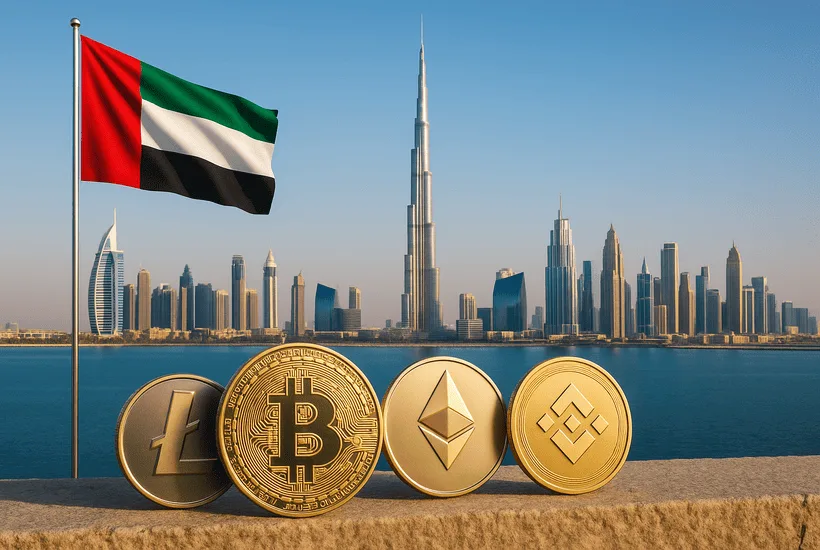Not a week goes by without an announcement that a new company or organisation in the UAE will now accept crypto as a form of payment. Even as I write this, Abu Dhabi based yacht maker Gulf Craft has announced that it will accept crypto, specifically stablecoins, as a form of payment. It comes hot on the heels of the Abu Dhabi Judicial Department (ADJD) accepting the AE Coin (the UAE’s first stablecoin) for judicial and legal service fees. While Emirates will also accept crypto to pay for flights. What exactly are we witnessing here?
Rather than speculative trading, the focus has firmly shifted to real-world utility. This isn’t a scattered collection of pilot programmes; it is a clear, top-down strategy to weave crypto into the very fabric of the UAE’s economy. The question is no longer if digital currencies will be used for everyday payments, but how soon.
The foundation for this shift has been meticulously laid through progressive and clear regulation. Authorities like the Virtual Assets Regulatory Authority (VARA) in Dubai and the Securities and Commodities Authority (SCA) have fostered a secure environment for digital assets to thrive. This regulatory clarity is what gives businesses and consumers the confidence to transact. And it is this framework that has enabled Dubai’s Department of Finance to partner with Crypto.com to accept digital currency for government services, a move aimed at accelerating the city’s transition to a cashless society.
Newsletter
Get weekly updates on the newest crypto stories, case studies and tips right in your mailbox.
But none of this would have happened if not for the emergence of a regulated, local stablecoin. The AE Coin, licensed by the Central Bank and pegged 1:1 to the Emirati Dirham, is a true game-changer. By removing the price volatility associated with cryptocurrencies like Bitcoin, the AE Coin provides a stable and reliable medium of exchange for daily transactions. This stability decreases friction in transactions, minimizes exchange-rate exposure, and reduces reliance on traditional banking infrastructure. We should also give credit to Air Arabia, the first major player to accept the AE Coin, before this recent spate of announcements.
What lies ahead?
With high-value assets like yachts and government fees already accessible via crypto, the next logical frontier is everyday consumer spending. Supermarkets, cafés and shopping malls. We have already heard that taxis will accept stablecoins for fares in Abu Dhabi, a very everyday expense. I use the example of a cup of coffee as that’s another very regular expense we all do on a near-daily basis. But I’m not talking about a handful of crypto-savvy people buying a flat white from Starbucks from one of their many digital wallets. I’m referring to mass adoption, when ‘normal’ people think nothing of paying for a cup of joe using a crypto wallet.
For that to happen, what do we need? For starters, a wider adoption of digital wallets (like Crypto.com or AE Coin’s own) to integrate seamlessly with Point of Sale (POS) systems. Plus, incentives for retailers need to be clearly explained. Merchants could save on card processing fees and enjoy faster settlements, pushing them toward stablecoin acceptance. This also leads to happy customers, tourists and residents alike. Imagine paying for your cappuccino in AE Coin quickly and smoothly? This is exactly what the UAE’s digital economy should enable. Mobile apps could combine loyalty programmes, digital ID, and crypto-payment options that would align perfectly with the UAE’s smart-city ambitions.
Despite this strong momentum, obstacles remain. While the AE Coin is pegged, other stablecoins (like USDC and USDT) carry counterparty and regulatory risks. Then there’s the compliance burden. Every payment channel demands rigorous KYC and AML safeguards – a hurdle for small retailers and fintechs trying to scale. Finally, there’s public trust. People lump crypto altogether (often with thoughts of scams and volatility) and don’t distinguish between Bitcoin, stablecoins and other coins and tokens.
Why go all-in on crypto payments?
For one thing, it leads to economic diversification, as the UAE aims to pivot toward a knowledge-based, fintech-led economy. Then there’s the tourism play: enabling global travellers to pay directly in crypto simplifies spending, with no need to exchange currencies. And of course global competitiveness. As jurisdictions like Luxembourg and Singapore pilot stablecoin usage, the UAE’s proactive approach positions it as a global frontrunner.
While paying for multi-million-dollar yachts with stablecoins like USDT and AE Coin grabs headlines, and booking a flight on Emirates with crypto (a feature expected from 2026) signals mainstream acceptance, the true measure of success will be in retail adoption.
The infrastructure being built for these high-value transactions is the same one that will eventually allow residents to pay for their groceries, shopping, or a daily coffee with a simple tap of a digital wallet. The era of paying for everyday goods and services with crypto in the Emirates is fast approaching.
Justin Harper is a freelance business, finance and crypto writer and editor who has worked for the BBC, FT Business, Daily Mail and Campaign Middle East during a career spanning more than 25 years.
DISCLAIMER
The views and opinions expressed in this article are solely those of the author and do not necessarily reflect the views or endorsements of Coin Headlines. Readers are encouraged to conduct their own independent research










